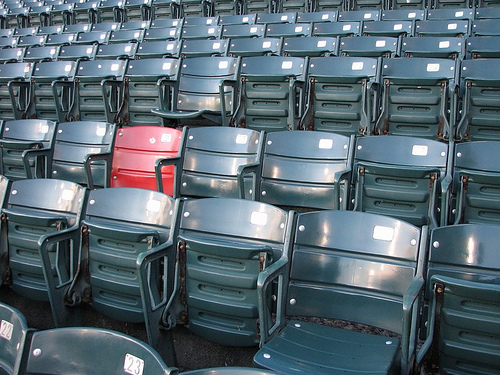On a recent trip to Boston, I visited Fenway Park for the first time. Being at Fenway is like being in an old church. They have been playing baseball there since its gates were opened on April 20, 1912. It is the oldest park in the major leagues. I saw the Green Monster (pronounced “Monsta” if you’re from Boston), the hand operated scoreboard signed in Morse Code by former team owners, the antique seats, the press box and something I never knew about until I visited this famed ballpark –the Red Seat.
Seat 21 in Row 37 of Section 42 is a splash of contrast in the green sea of right field. It marks the spot where in 1946 the Hall of Fame Red Sox great Ted Williams hit the longest homerun ever recorded at Fenway Park, a 502’ gapper which landed through the straw hat and squarely on the head of Joseph Boucher, a napping fan later quoted in the newspaper saying “How far away must one sit to be safe in this park? ” It is a visual reminder connecting the past to the present, giving the place a deep since of rootedness and historical significance to fans.
I grew up watching Harry Caray call Cub’s games, collecting baseball cards, playing cup ball and spending countless hours in the batting cage. Baseball was my universe until my talent peaked in college and I hung up my glove and spikes to become a lawyer. The end of my amateur sports career created somewhat of an identity crisis in my life, which I am learning is a theme for other guys who played sports, regardless of whether they quit in junior high or after years of getting paid. I defined myself as a ball player, sharing in the community of my teammates, and with a statistical reference point for my validity –games played, bat speed, arm strength, hits, errors and the rest. After baseball, I grew my hair long, shopped at second hand stores, traveled in Europe and went searching for a new identity, a counterculture of sort. Fortunately I guess, I found a new personality, one of being a law student. Seeking my juris doctorate fashioned a new way to define myself, again with a community of others similarly situated and a new statistical reference point or measurability for my worth–grades, internships, awards and academic accolades. But then like baseball, law school was over. The only thing left to do was to go to work, providing a much more fragmented community with the only measurability coming from the acquisition of stuff, which is fleeting, hollow and unwinnable.
To find significance, we need to be connected to something bigger than just us. Not like the people of Boston or baseball fans in general are connected to Fenway, or like ballplayers are united with their team or the game itself. Because when we put our hope in something finite and temporary like a place or a game or even a person, we will be disappointed. The Red Seat is really cool, and the story is even better. But it is just a chair representing a brief moment in the history of a place used to play a game.
Our challenge, then, is to be connected to something outside of ourselves that is big and that is worthy.
Craig Robertson is a family law attorney practicing throughout Mississippi.


